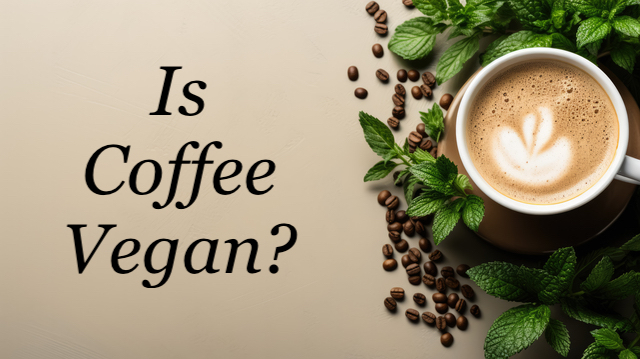Is Coffee Vegan? A Deep Dive into the World of Java
As someone who’s passionately traversed through the vegan lifestyle for years and has an unwavering love for coffee, I often get asked, “Is coffee vegan?” A simple question, but the answer? Well, let’s dive deep.
Understanding the Basics: What Makes Something Vegan?
Navigating the vegan landscape might seem like trekking through uncharted territory for many. I mean, on the surface, it seems straightforward, right? No meat, no dairy, no eggs. But take a step deeper into the rabbit hole, and you’ll see that veganism is as much about the nuances as it is about the blatant. Let’s embark on this journey to understand its essence.
Defining Veganism
Veganism, at its core, isn’t just a dietary choice – it’s a lifestyle. Rooted in a profound respect for animals and a determination to minimize harm, veganism means abstaining from consuming or using any products derived from animals. This includes everything from the food we eat to the clothes we wear, and even the cosmetics we use.
A common misconception is that veganism is purely about health. While many vegans do experience health benefits from avoiding animal products, the primary motivation is often ethical. The decision not to consume or use animal products stems from a desire to not contribute to the suffering of animals and to reduce environmental degradation.
The Ethical Backbone
Many turn to veganism after learning about the conditions in which animals are raised for consumption. Factory farming, for example, has been under scrutiny for its treatment of animals, environmental impact, and contribution to global greenhouse gas emissions.
Moreover, veganism extends beyond just food. The leather industry, for example, has been linked to massive environmental pollution, and the fur industry is notorious for cruel practices. So, when vegans opt for faux leather shoes or refuse a fur-trimmed coat, it’s an extension of their commitment to cruelty-free living.
Common Non-Vegan Ingredients to Watch Out For
Veganism is a vigilant journey. Products you’d assume are vegan might surprisingly contain animal-derived ingredients. Gelatin, derived from animal bones and skin, can be found in many gummy candies and even some yogurts. Lanolin, a substance derived from sheep’s wool, is a common ingredient in lip balms and lotions. Even some beers and wines are clarified using isinglass, a substance obtained from fish bladders.
The Spectrum of Plant-Based Choices
It’s worth noting that within the world of plant-based diets, there’s a spectrum. While all vegans are plant-based, not everyone on a plant-based diet is necessarily vegan. Some might avoid animal products for health reasons but might still wear leather or use products tested on animals.
Coffee at Its Core: The Beans
At first glance, the question of whether coffee is vegan might seem simple. It’s just beans and water, right? However, when you start digging deeper into the journey of a coffee bean from plant to cup, you’ll find a few intricacies worth considering. Let’s uncover the vegan status of coffee, focusing particularly on the beans.
Natural Origins and Growth
Coffee beans originate from the cherries of the Coffea plant. The natural process of growing coffee beans is completely plant-based, making the raw coffee bean itself inherently vegan. The two primary types of coffee beans, Arabica and Robusta, are both derived from plants without involving animals in any direct capacity.
Harvesting and Initial Processing
Harvesting the beans is mostly a manual process, where workers pick the cherries by hand. Following this, the cherries are processed to extract the beans, usually using one of two methods:
Washed Process:
This method involves soaking the cherries in water, which helps to separate the beans from the fruit. No animal-derived products are used in this method.
Natural Process:
Here, the cherries are left to dry in the sun. Again, this method doesn’t incorporate any animal products.
So, from a bean processing standpoint, coffee remains vegan-friendly.
Roasting and Flavoring: The Potential Caveats
The roasting process itself is vegan, as it’s simply about heating the beans. However, potential issues arise when flavorings are added. Some flavored coffees might use non-vegan ingredients, such as dairy-derived substances or additives tested on animals. Always check the label if you’re buying flavored coffee to ensure it doesn’t contain any non-vegan ingredients.
Animal Involvement: A Note on Civet and Luwak Coffee
There’s a niche market for coffees like Civet or Luwak coffee, where beans are eaten by animals (like the civet cat), then collected from their feces, cleaned, and roasted. While the beans themselves remain plant-based, the involvement and potential exploitation of animals make this type of coffee ethically challenging for vegans. Concerns include the well-being of the civets, many of which are kept in captivity under questionable conditions to produce these beans.
The “Milk” Dilemma in Coffee
Ah, milk and coffee – an iconic duo that has stood the test of time. But when it comes to the vegan world, milk becomes a topic of contention. Let’s dive deep into the “milk” dilemma in coffee and understand what it means for those embracing the vegan lifestyle.
Traditional Dairy: The Non-Vegan Staple
Traditionally, milk sourced from animals – particularly cows and sometimes goats – has been a mainstay in coffee drinks. Whether it’s a creamy latte, a cappuccino with a frothy top, or just a splash of milk in a black coffee, dairy has been integral to coffee culture for centuries. However, from a vegan perspective, dairy milk is off the table. The dairy industry often raises ethical concerns regarding animal treatment, and dairy products, by definition, aren’t plant-based.
Rise of Plant-Based Milks
With the growth of veganism and dietary preferences, the last few decades have seen a surge in the popularity of plant-based milks. These provide a vegan alternative to traditional dairy, making it possible for vegans to enjoy their favorite creamy coffee drinks without compromise. Some popular plant-based milks include:
Almond Milk:
Made from blended almonds and water, this milk alternative offers a nutty flavor. It’s lower in calories than cow’s milk, though it might not froth as well for certain coffee drinks.
Soy Milk:
One of the earliest and most popular milk substitutes, soy milk froths relatively well, making it suitable for lattes and cappuccinos. It has a creamy consistency similar to dairy milk.
Oat Milk:
A favorite in many coffee shops, oat milk is known for its naturally sweet taste and creamy texture. It also froths well, making it a barista favorite.
Cashew, Rice, Coconut, and More:
The list of plant-based milks continues to grow. Each brings its unique flavor and consistency to the table.
The Quality and Taste Spectrum
Not all plant-based milks are created equal, especially when mixed with coffee. Factors such as the brand, additives (like sweeteners or thickeners), and the coffee’s acidity and flavor profile can all influence the end result. It’s often a matter of personal preference, so it’s worth experimenting with different milk alternatives to find the perfect match for your coffee.
Environmental Considerations
While the vegan choice is often rooted in ethics related to animal welfare, environmental considerations also play a part. Producing plant-based milk, in general, requires less water and emits fewer greenhouse gases compared to dairy milk. However, there are environmental differences between different types of plant milks too. For instance, almond milk production can be water-intensive, while oat milk often touts a lower environmental footprint.
Hidden Non-Vegan Culprits in Coffee
Coffee, at first glance, seems like a simple, plant-based beverage. However, when you delve deeper into the world of coffee culture and production, you’ll find elements that may not align with vegan principles. Let’s shed light on some lesser-known, non-vegan culprits that could be lurking in your coffee cup.
1. Bone Char in White Sugar:
While coffee itself is plant-based, the sweeteners added can be questionable. One major culprit is white sugar, which is often processed with bone char, derived from animal bones, to achieve its pure white color. If your coffee shop or favorite brand uses white sugar, it might not be vegan-friendly. It’s worth seeking out coffee shops that use alternative methods or offer organic sugar, which doesn’t use bone char.
2. Flavorings and Syrups:
Many popular coffee concoctions, particularly those from large chains, contain flavored syrups that enhance the taste of the beverage. While many are plant-based, some might contain hidden animal derivatives like glycerin from animal fat or even dairy. It’s always wise to ask about the ingredients or look for brands that clearly label their syrups as vegan.
3. Gelatin in Capsules:
For those who enjoy the convenience of coffee capsules or pods, be wary. Some brands use gelatin in the casing. Gelatin is derived from animal bones and connective tissues, making it non-vegan. Ensure you choose brands that use vegan-friendly materials for their pods.
4. Non-Vegan Whipped Cream:
A dollop of whipped cream can elevate certain coffee drinks, but traditional whipped cream is dairy-based. While many coffee shops now offer vegan whipped cream alternatives made from coconut or almond, always double-check before adding it to your drink.
5. Certain Types of Processing:
Some coffee beans are processed using animal products. For instance, civet coffee (or Kopi Luwak) involves civet cats consuming coffee cherries, which are then collected from their feces. Not only is this process questionable from a vegan standpoint due to animal exploitation, but it also raises ethical concerns related to animal welfare.
6. Some Coffee Filters:
Believe it or not, some coffee filters are processed using epichlorohydrin, a compound that can be animal-derived. While this isn’t common, it’s worth checking, especially if you’re dedicated to ensuring every aspect of your coffee consumption is vegan.
Eco-friendly and Vegan: The Perfect Match
In the vast and varied world of coffee, the question “Is coffee vegan?” becomes all the more intriguing when paired with environmental considerations. For the conscious consumer, a cup of coffee isn’t just about taste or a caffeine boost; it’s about ethical choices and the planet’s well-being. Let’s brew some understanding on how veganism and eco-friendliness intersect in the realm of coffee.
1. Plant-based Milks: A Win for the Environment and Animals
Vegan Choice: Opting for plant-based milks like almond, soy, or oat not only ensures your coffee remains animal-free but also reduces the demand for dairy, an industry linked to significant environmental degradation.
Eco-benefit: Plant-based milks generally have a lower carbon and water footprint than dairy milk. For instance, producing almond or oat milk requires significantly less water than cow’s milk.
2. Organic Coffee Beans: Kind to the Earth and Animals
Vegan Concern: While coffee beans are plant-derived and inherently vegan, the cultivation process matters. Some farming practices may harm animals, such as pesticide use affecting pollinators or birds.
Eco-friendly Choice: Organic coffee ensures no synthetic pesticides or fertilizers are used, reducing harm to the ecosystem and its inhabitants.
3. Cruelty-free and Sustainable Packaging:
Vegan Principle: Beyond the coffee itself, true veganism considers the entire product lifecycle. This includes how coffee is packaged, ensuring no animal products are used, and no animals are harmed in the process.
Eco-conscious Packaging: Compostable or recyclable packaging not only aligns with vegan principles but also ensures a reduced environmental impact.
4. Fair Trade and Shade-Grown Coffee:
Vegan Ethos: Ethical treatment extends to human beings too. Vegans often support equitable trade practices that offer fair wages and good working conditions to coffee farmers.
Eco-advantage: Shade-grown coffee promotes biodiversity, providing habitats for birds and other wildlife. It also helps in reducing deforestation and conserving soil.
5. Reducing Waste:
Vegan Habits: Bringing your reusable cup for that coffee-to-go embodies the vegan principle of minimizing waste and harm.
Eco-friendly Practice: Reducing single-use plastics and cups aligns with both environmental and vegan principles. It cuts down waste and lessens the environmental damage from plastic production and disposal.
6. Supporting Vegan and Eco-friendly Cafés:
Vegan Patronage: Vegan cafes ensure all offerings, from coffee to pastries, align with cruelty-free standards.
Eco-benefit: Many vegan cafes inherently prioritize sustainability, using local produce, minimizing waste, and often advocating for environmental causes.
Conclusion: A Vegan’s Coffee Guide
Being vegan doesn’t mean giving up on flavors or favorites. It’s about making informed choices. So, next time you brew, let it be a cup that aligns with your values.
Is Coffee Vegan FAQs
Can vegans drink black coffee? Absolutely! Black coffee, at its purest, is just water and coffee beans.
Is flavored coffee vegan-friendly? It varies. Always check ingredients, especially for hidden dairy or animal-derived additives.
What are the best vegan milk alternatives for coffee? Almond, soy, oat, and coconut milk are popular choices.
Do vegans need to worry about coffee capsules or pods? It’s always a good idea to check. Some pods might have non-vegan ingredients.
How do I ensure my sugar is vegan? Opt for organic sugars or those labeled vegan, which haven’t been processed with bone char.




